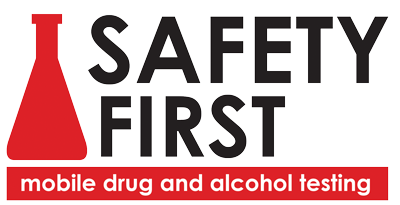Drug and alcohol testing services
A number of workplaces require Drug and Alcohol testing as a compulsory requirement for their workers.If the testing is not carried out it can affect Work Cover rates, as well as the loss of productivity for the organisation. Safety First understand this. Their services are efficient, affordable and mobile so that it is a convenient process for an organisation with minimal disruptions to the workplace. Workplaces have a legislative obligation to maintain health and safety standards and workplace drug and alcohol testing is vital in managing such standards. For example, in the mining industry, workers are required to be drug tested every 28 days. A workplace can partner with Safety First to do this for them, therefore ensuing that all employees scheduled for testing is completed. The testing can be arranged from a list generated by the organisation or Safety First can create randomised lists of employees.
Any form of alcohol and drug testing in a workplace has to comply with the International Labour Organisation’s (ILO) Code of Practice on the management of alcohol and drug related issues in the workplace – this is particularly the case where the testing undertaken is on a random basis, rather than ‘for cause’. The mobile drug and alcohol testing of Safety First is designed to maximise compliance with codes of practice and workplace health and safety legislation and regulations; which can be a mindfield in itself. That is where organisation’s can can be assured that Safety First partner with an organisation to work in with different shifts, multiple sites and over various timeframes, and they can provide a team of testers depending on the needs of the workplace.
Safety First’s clients generally opt for a multi-step process that involves the use of presumptive test kits (that will test urine or oral fluid samples) for onsite screening. Those samples that react to the kit are then sent into the laboratory for further testing. All testing is complaint with the Australian standards, legislation and best practice. The services of Safety First are affiliated with a National Association Testing Authority (NATA) Approved Pathology Provider in the event that a sample requires confirmation of a non-negative result.
Safety First’s services are NATA accredited with the urine testing meeting Australian Standard AS/NZS 4308:2008 (Procedures for specimen collection and the detection and quantitation of drugs of abuse in urine).and oral fluid testing meeting Australian Standard AS 4760:2006 (Procedures for specimen collection and the detection and quantitation of drugs in oral fluid).
One of the major challenges with a drug testing program is maintaining up to date screening methods as more new drugs enter the market. Brendan Sweeney, as an industry expert in Drug and Alcohol Testing keeps abreast of industry updates and screening tests. New drugs are most often detected by the Australian Customs and Border Protection Service who send away the drugs for identification, from this identification these drugs are then included in drug screen tests. This is the type of information that Brendan ensures he and his team are aware of and apply when carrying out drug screening.
Safety First test for a range of drugs such as cocaine, opiates, cannabis, methamphetamines, amphetamines and benzodiazepines; any form of these drugs in an employee’s system is not going to ensure a healthy productive worker – both to the worker themselves and the risk they may be to other workers. Results are immediate – within 5 minutes for an Instant Drug Test (IDT) and for lab results within 48-72 hour turnaround time. The results for drugs tests are in the form of a positive or negative answer. A positive drugs test only indicates that the individual has used the drug recently because although the amount of drug in the urine can be measured, there is no reliable correlation between this amount and the extent of cognitive or motor impairment in the individual. Compared with alcohol testing where there is a generally accepted correlation between the amount in the blood and the degree of motor skills impairment.
